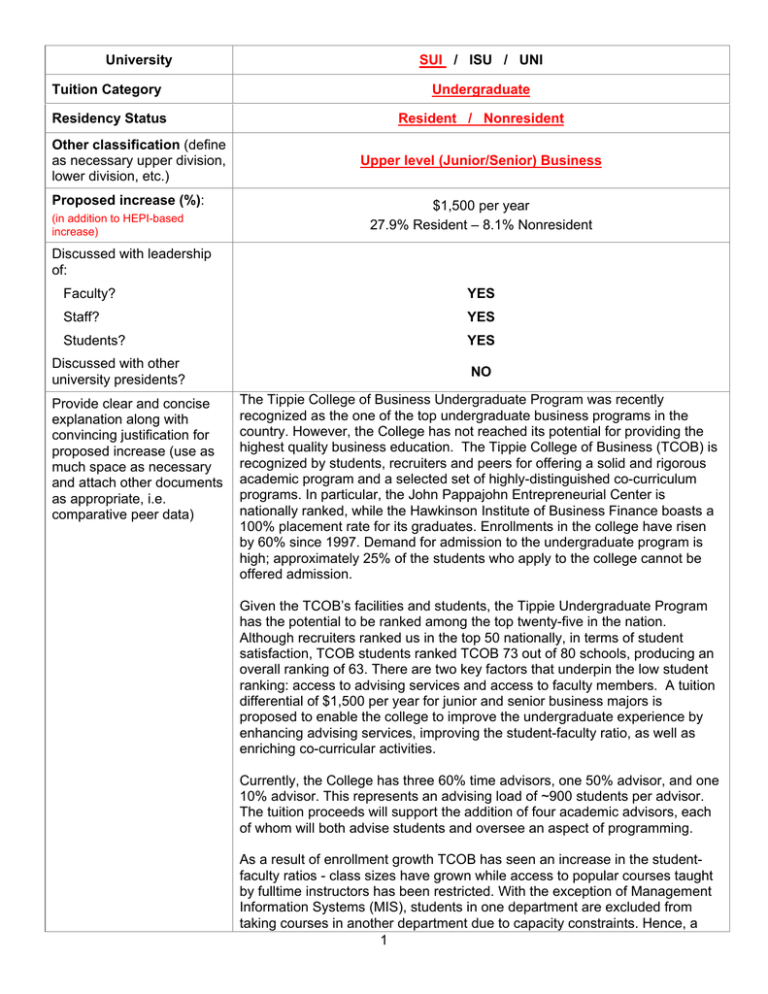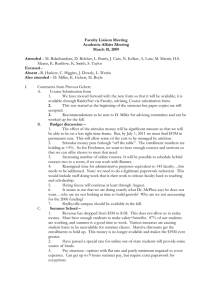as necessary upper division, $1,500 per year 27.9% Resident – 8.1% Nonresident
advertisement

University SUI / ISU / UNI Tuition Category Undergraduate Residency Status Resident / Nonresident Other classification (define as necessary upper division, lower division, etc.) Proposed increase (%): (in addition to HEPI-based increase) Upper level (Junior/Senior) Business $1,500 per year 27.9% Resident – 8.1% Nonresident Discussed with leadership of: Faculty? YES Staff? YES Students? YES Discussed with other university presidents? Provide clear and concise explanation along with convincing justification for proposed increase (use as much space as necessary and attach other documents as appropriate, i.e. comparative peer data) NO The Tippie College of Business Undergraduate Program was recently recognized as the one of the top undergraduate business programs in the country. However, the College has not reached its potential for providing the highest quality business education. The Tippie College of Business (TCOB) is recognized by students, recruiters and peers for offering a solid and rigorous academic program and a selected set of highly-distinguished co-curriculum programs. In particular, the John Pappajohn Entrepreneurial Center is nationally ranked, while the Hawkinson Institute of Business Finance boasts a 100% placement rate for its graduates. Enrollments in the college have risen by 60% since 1997. Demand for admission to the undergraduate program is high; approximately 25% of the students who apply to the college cannot be offered admission. Given the TCOB’s facilities and students, the Tippie Undergraduate Program has the potential to be ranked among the top twenty-five in the nation. Although recruiters ranked us in the top 50 nationally, in terms of student satisfaction, TCOB students ranked TCOB 73 out of 80 schools, producing an overall ranking of 63. There are two key factors that underpin the low student ranking: access to advising services and access to faculty members. A tuition differential of $1,500 per year for junior and senior business majors is proposed to enable the college to improve the undergraduate experience by enhancing advising services, improving the student-faculty ratio, as well as enriching co-curricular activities. Currently, the College has three 60% time advisors, one 50% advisor, and one 10% advisor. This represents an advising load of ~900 students per advisor. The tuition proceeds will support the addition of four academic advisors, each of whom will both advise students and oversee an aspect of programming. As a result of enrollment growth TCOB has seen an increase in the studentfaculty ratios - class sizes have grown while access to popular courses taught by fulltime instructors has been restricted. With the exception of Management Information Systems (MIS), students in one department are excluded from taking courses in another department due to capacity constraints. Hence, a 1 finance student who might benefit from an advanced Accounting course cannot currently enroll in such a course. In fact, students in the Tippie College of Business are currently prohibited from declaring a second major in the College due to the inability to ensure access to courses and faculty. Advising surveys indicate that many students want to earn a double major, and rate the business program unfavorably because of the current restriction on double majors. Tuition proceeds will support the addition of seven tenure/track faculty, in the areas of Finance (4), Marketing (2), and Accounting (1), which will enable the College to offer the type of programming and access to faculty that students have come to expect from top-tier business schools. A portion of the tuition proceeds will also support specialized programs that enhance students’ academic experience and link them to career opportunities including, the honors program for high achieving students, the global internship program, and a Hawkinson-type institute in Marketing. Tippie College of Business students are well-prepared academically for their lives after graduation; however, their ability to leverage that education into a fulfilling and successful career depends to a large extent on their participation in co-curricular activities. Students who have held internships, pursued study abroad opportunities, networked with business leaders, participated in student organizations and developed their leadership capabilities are more competitive candidates for employment opportunities or for advanced degree programs. For example, Hawkinson Scholar students complete one or more internships prior to graduating, interact on a one-on-one basis with business leaders, and receive intensive career and academic counseling. The Hawkinson Institute boasts a 100% placement rate for its students. The success of Hawkinson Scholars has had a trickle down effect on other business students; employers have found the Hawkinson Scholars to be some of their best recruits, and have started to interview other Tippie students as well. Tuition proceeds will extend the Hawkinson model to students interested in careers in Marketing. The Tippie College of Business Senate, an elected representative student group within the Tippie College of Business, has expressed its support for this proposal. 2 It is anticipated the new supplement will generate $2,400,000 in FY2009. The proposed use of these funds includes: Amount Category $245,000 P&S Salaries $105,000 P&S Salaries $1,040,000 Faculty Salaries $400,000 Faculty Salaries $250,000 Faculty Salaries $360,000 Student Aid Description Academic Advisors – add 4 FTE – Reduce Student Advising Load from ~900 to 350 0.5 FTE Staff in each of the following student support areas: Marketing Institute ($35K), Honors Program ($35K), International Internship Program ($35K) Finance 4 Tenure/Track Faculty – Increase Course Sections by 14 Marketing 2 Tenure/Track Faculty – Increase Course Sections by 6 Accounting 1 Tenure/Track Faculty – Increase Course Sections by 3 Set Aside for Student Financial Aid @ 15% $2,400,000 Total As the table below indicates, even if the $1,500 tuition supplement was in effect this year, upper division tuition at the UI Tippie College of Business would remain the lowest among colleges of business at public Big Ten universities. Upper Division Business College Tuition (2007-08) University Penn State Michigan Michigan State Purdue Illinois Minnesota Ohio State Wisconsin Indiana Iowa current Iowa + 1,500 14,068 12,396 10,975 8,394 8,306 7,950 7,875 7,330 6,999 5,376 6,876 3 Concisely describe how proposed increase will assist the university in making progress on strategic goals and objectives This plan is consistent with the The Iowa Promise: A Strategic Plan for The University of Iowa 2005-2010. Specifically, the supplement will support the following strategies: GOAL: To create a University experience that enriches the lives of undergraduates and helps them to become well-informed individuals, lifelong learners, engaged citizens, and productive employees and employers. Strategy: Recruit and retain a student population that can succeed at a comprehensive research university, and nurture their success, by: • Easing the transition for new students, guiding all students through their majors, and providing excellent academic advising. [TCOB: improve and expand access to academic advising] Strategy: Promote excellent teaching, effective learning environments, and learning opportunities that leverage the University’s strengths by: • • Strengthening the honors program and other opportunities for highachieving students. [TCOB: create additional Hawkinson-type experiences for students; enhance the Honors Program; increase the number of students participating in national leadership conferences] Developing more first-year seminars, honors courses, and other small class venues where students can interact with tenured faculty; [TCOB: enhance faculty vitality to ensure sufficient tenured and tenure-track faculty are available to teach in high-demand majors] Strategy: Ensure that all students graduate with strong core skills, a broad liberal arts education, and concentrated study in one or more majors by: • • Providing them with opportunities to develop leadership and teamwork skills and an understanding of business and other organizations; [TCOB: increase access to leadership programs, expand advising capability] Continuing efforts to internationalize the educational experience; [TCOB: increase access to international internship experiences; ensure that any student who wishes to participate has the opportunity and resources to participate] Strategy: Help undergraduates prepare for life within and beyond college by: • • • Communicating to them the value of community involvement and participation in democratic governance; [TCOB: create leadership center to encourage community engagement and the enhancement of leadership skills] Providing career advising that will enable them to pursue their employment goals; [TCOB: enhance advising services] Providing curricular and cocurricular opportunities that will enable them to understand and succeed in a multicultural and global community [TCOB: increase funding for international internship opportunities] 4 For nonresident undergraduates, does the tuition amount cover the full cost of education as calculated by the biennial unit cost study? YES I:\VPFO\Yanecek\09TuitionFees-TCOB-Undergrad Upper REVISED.doc 5

